|
TRANSLATE THIS ARTICLE
Integral World: Exploring Theories of Everything
An independent forum for a critical discussion of the integral philosophy of Ken Wilber
 Ray Harris is a frequent contributor to this website. He has written articles on 9/11, boomeritis, the Iraq war and Third Way politics. Since 2007 he took to writing his novels Navaratri, Wild Child and Eden. Harris lives in Ballarat, Victoria, Australia. Ray Harris is a frequent contributor to this website. He has written articles on 9/11, boomeritis, the Iraq war and Third Way politics. Since 2007 he took to writing his novels Navaratri, Wild Child and Eden. Harris lives in Ballarat, Victoria, Australia.
Integral GeopoliticsPart 4: The Developmental Ethical ImperativeRay Harris
By most measures the countries that best support the full hierarchy of needs, from basic survival to self-realisation, are the social democracies, particularly the Nordic countries.
What are the ethical implications of the various developmental models? If they are valid, then surely the realisation of human potential is the primary ethical imperative? Conversely, is there a moral argument for the suppression of human potential in the name of a greater good? What is that greater good? In previous essays I've referred to Kohlberg's stages of moral reasoning and Commons's model of hierarchical complexity. In this essay I'll add Maslow's hierarchy of needs and Graves's emergent cyclical theory to the list. (I recognise Ken Wilber's formulation of the basic moral intuition in relation to his AQAL model: to protect and promote the greatest depth for the greatest span).
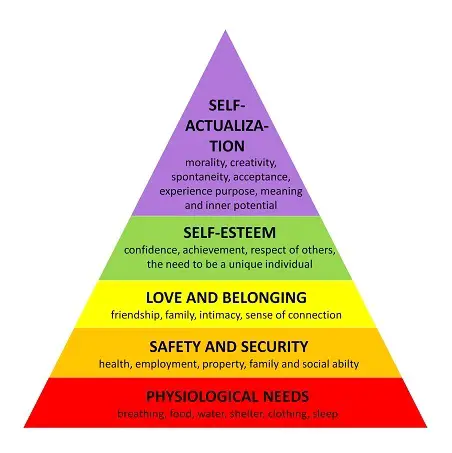 Let me state the developmental ethical imperative: the highest ethical principle is enabling people to achieve their full potential. Let me add a caveat: the developmental ethical imperative applies to every individual without exception - all for one and one for all.
THE BARRIERSClearly a number of barriers exist that work against people reaching their highest potential. Maslow's hierarchy states that specific needs must be met before an individual can hope to achieve self-actualisation. Graves also recognised that his values hierarchy arose from a hierarchy of life conditions: A - imperative physical needs B - safety and security C - social constraint and resistance D - awareness of inequality and limitation E - existential anxiety, life's purpose F - existential equilibrium, peace with self and others Following both Maslow and Graves let's expand on the barriers.
1. Physical barriers.There are a number of inherited and acquired physical conditions that inhibit development. Obviously if an individual contracts a debilitating disease they must overcome both cognitive and physical barriers. A number of viruses can cause the complication of CFS (chronic fatigue), which affects cognitive ability. At worst disease can end life. Inherited disabilities can also place severe constraints on human potential. The developmental imperative (DI) requires an effort to overcome these limitations through the prevention of disease and the removal of the barriers caused by inherited disability. Perhaps the prime example is the technology used by physicist Stephen Hawking to overcome the restrictions caused by motor neuron disease.
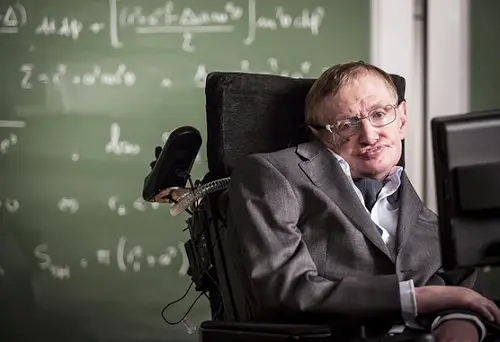
2. Material barriers.For most of its history humanity has struggled with the natural world in order to meet the most basic needs of food and water. There are still many societies vulnerable to the whims of the natural world: droughts, floods, fire, storm, blight. Famine is an ever constant threat in many parts of the world. The main driver of innovation has been developing technologies to secure a steady supply of water and food. As societies became more complex they began to develop ways to supply the essentials to the most needy. Ancient Rome, for all its reported cruelty, created a system of supplying food to the poor in the form of the grain dole, or the Cura Annonae. Today the concept of aid has been greatly expanded to offer international relief in the event of natural and man made disasters. The DI requires expanded effort to provide the basic needs. This includes improvement in agricultural and food technology, as well as equitable distribution. But material needs extend beyond the basics to shelter and essential implements and tools, for example, pots for cooking and beds for sleeping. It also extends to tools for creativity. A potential musical prodigy remains unrealised without an instrument to play.
3. Psychological barriers.As we examine each of these categories of limitation, we are adding layers of complexity. I am necessarily simplifying due to the constraints of this format. Truth is, volumes have been written on the self-limiting narratives constructed by the human psyche. Let me list some of the factors: A) The stress response. The primatologist Robert Sapolsky (1) has done extensive work on how stress impacts primate/human behaviour. Long term exposure can cause cognitive decline and a host of reactive behaviours linked to PTSD. B) Inherited conditions such as psychopathy, bi-polar disorder, autism, ADHD, OCD, etc. I've watched people I have known rapidly decline in capacity due to the onset of schizophrenia. C) Acquired cognitive and affective disorders caused by child abuse. One example is FASD, foetal alcohol spectrum disorder, a range of developmental conditions caused by foetal exposure to alcohol. It is known that the four aspects of child abuse: neglect and physical, sexual and emotional abuse cause profound long term affects. D) Inherited cognitive and affective capacity. As we know, human cognitive capacity occurs across a wide range. The same applies to EQ, or emotional intelligence. People vary greatly in their capacity to understand and regulate their emotions, especially anger, jealousy and desire. The Dunedin Study (2) has defined impulse control as a significant factor in public health and social outcomes. E) Personality traits. There are several models that propose distinct personality types. I won't address them all. Perhaps the most famous is derived from Jung's theories and refined in the Myers-Briggs Type Indicator. There has been some recent focus on the dark triad of narcissism, machiavelliansm and psychopathy. In contrast there is hypersanity (3): generosity along with high emotional and cognitive intelligence. Since the 19th century significant gains have been made in the fields of psychology and psychiatry. The DI not only supports further study but also affordable access to mental health care.
4. Cultural barriers.Humanity is enormously diverse in its cultural beliefs and practices. Whatever is taboo in one culture might be celebrated in another. The Abrahamic faiths of Judaism and Islam forbid the eating of foods that are prized in other cultures. Some have argued that the incest taboo is universal, yet we know it was practised by the Egyptian, Hawaiian and Incan elites. Many of these customs and moral injunctions are irrational and expressions of Gebser's magical and mythical worldviews. Some seem to be devised simply to distinguish one tribal or ethnic group from another. Most exist to enforce a hierarchical social system: perhaps the most vicious of these is the Hindu caste system which believes that only Brahmin males can achieve moksha (liberation from samsara), and which has declared an entire caste untouchable. Following this we can assess which cultures are open and allow individuals to achieve their highest potential and which are closed and actively prevent the realisation of potential.
5. Conflict barriers.The history of humanity is also the history of conflict. Needless to say violence, whether it is tribal or between states, plunges everyone back to survival mode. It also wastes the lives of countless talented individuals and wipes away cultural progress, remembering that the very worse examples are wars of genocide. For this reason the DI categorically rejects the use of violence to resolve disputes, unless it is for purely defensive reasons.
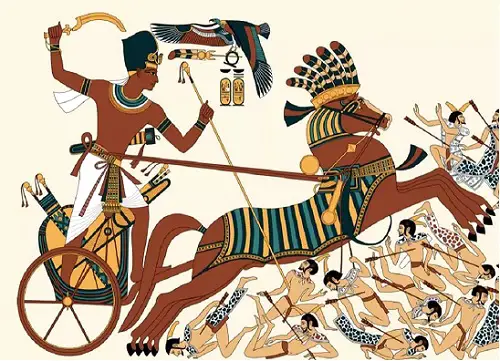
6. Ideological barriers.By ideology I mean any system of belief, including religious, secular and/or political. It is a key aspect of all ideological thinking that it establishes principles from foundational assumptions and then seeks to justify those assumptions ex post facto, often using sophisticated techniques of rationalisation and rhetoric. When under challenge, ideologies often resort to suppressive techniques such as violence, censorship and condemning critics as heretics or traitors. The problem is that many ideologies are exclusive and seek to advantage specific categories of people defined by religion, ethnicity, nationality, class or gender - the most notorious being ideologies that promote anti-Semitism. Others discriminate against women, some against specific races, some against homosexuals. In each case a category of people are denied the right to reach their full potential. In the very worse examples entire groups are set aside for elimination.
7. Political barriers.Whilst this is connected to ideology, it is a seperate category. Politics is the process of managing differences of opinion. People form coalitions and oppositions around various proposals, from the national level to the local. Differences of opinion may be based on ideological affiliation but they are just as likely to be based on factional or personal self-interest. Political corruption is a serious problem in many parts of the world. Corporations and special interest groups are willing to pay bribes to avoid legislative restrictions or gain contracts and permissions. Some politicians have built considerable personal wealth through bribes and gifts. Even in advanced democracies with some form of legislative control there is a large lobbying industry seeking to advance sectional interests, both corporate and public. Large sums of money are spent to sway the opinion of political parties and the general public. These forces regrettably resort to the techniques of psychological manipulation and outright disinformation.
8. Developmental barriers.Like it or not, human cognitive capacity covers a wide range. The majority of the population sits between 85 - 115 IQ points. As discussed in my previous essay, each standard deviation (15 points) corresponds (roughly) to a marked change in thinking. Each stage represents an expansion in the capacity to handle complexity with a corresponding increase in the circle of concern. The lower stages tend to egocentric and ethnocentric thinking. They are primarily concerned with achieving their personal or in-group's highest potential and may not show any concern for, or awareness of other's needs.
THE OPTIMAL CONDITIONS FOR HUMAN THRIVING.We know what these are. We have for a long time. But I need to restate them. Again, following Maslow's hierarchy.
1. Access to clean water and good nutrition.Seems obvious doesn't it? And yet children all over the world are denied access to clean water and adequate nutrition. Humanity exists between two extremes: starvation and malnutrition to obesity and health problems caused by added sugar, trans fats and chemical additives. Too little food and too much food can affect both cognitive and affective capacity. These extremes can also affect the body's immune response. The basic nutritional needs can be met with a simple diet well within the agricultural capacity of the planet. The amount of food waste and excess production of junk food is grossly inefficient (but profitable).
2. Psychological well being.This includes emotional and intellectual security. Again we've also known this for sometime. Children need both emotional and intellectual support if they are to reach their full adult potential. And yet this seems the most difficult to guarantee. This is a very broad topic but I do want to highlight some deeply entrenched problems. Obviously it is difficult to provide emotional and intellectual security during periods of intense social distress: famine, natural disasters, war and political conflict. But even during periods of relative abundance and political stability, children can be subject to neglect and abuse. Recent decades have witnessed revelation after revelation of institutional child abuse. This process is ongoing. Whilst the main focus has been on the extensive clerical abuse within the Catholic Church, it involves multiple secular and religious organisations. The other source of abuse is familial. This is the most entrenched of all with abusive parenting styles part of the overall culture. Such abuse is often multi-generational, being handed down from parent to child. Here I want to again highlight the work of Robert Sapolsky into the impact of stress on individual development. Long term exposure to stress reduces IQ and weakens the immune response. Conversely a balanced exposure to the beneficial hormones oxytocin, serotonin, dopamine and endorphin can reverse the negative effects of stress. The other factor is education. Individuals must be exposed to as broad a range of knowledge and experience as possible. No child can realise an inherent talent without exposure to the tools of the relative discipline. In the case of musical talent it is exposure to music and musical instruments, in the case of athletic talent it is exposure to sport and sporting equipment, in the case of mathematics, again exposure to mathematics.
3. OpportunityIt can be argued that civilisation is the sum total of individual acts of insight and creation. Somewhere in our distant past an ancestor played in the mud and discovered they could mould useful shapes. Along the line another person discovered that if you placed clay in a fire it would harden. Somewhere else someone played around with reeds and discovered weaving. Whilst these techniques provided useful items, they were also amongst the first aesthetic objects. These discoveries existed as pure potential. They just needed resources, time and a safe space to be realised - each discovery building on another. The technologies and arts that make life worth living need the resources, time and space to be perfected and performed. And yet, not all people and not all societies have the resources or allow the time or space. Representative art is forbidden in many Islamic societies. And perhaps unbelievably, Elmore City, a town in the USA, banned dancing (4). Today the most popular form of entertainment is arguably some form of 'moving picture', now mostly displayed on home TV screens using complex digital electronics. Moving pictures encompass a very broad range of skills and talents. But it is an artform that could only be made possible by the accumulation of knowledge over centuries. As civilisations became more complex they began to build institutions and develop pathways that provided opportunity for individuals to reach their potential: libraries, galleries, museums, universities and specialist technical colleges, sporting clubs and facilities, dance academies, orchestras, concert halls, auditoriums, theatres, temples - the list is long. But perhaps more importantly, the more advanced civilisations provided financial support, whether through private or state patronage. These programs were extended to the poorer classes through scholarships, bursaries, grants and prizes, at all levels of society. It is no longer true that the realisation of potential is the exclusive province of the elites (especially in the field of popular music and sports).
PRAXISSurely it follows that if you accept the validity of the DI you will seek to apply it consistently with the aim of removing any internal or external barriers to realising potential. It also follows that it should be possible to determine the success or failure of societies and political systems/movements in implementing the DI. Let's consider some examples. Again, a caveat. These are just low resolution snapshots.
CambodiaModern humans arrived in SE Asia approximately 80,000 years ago. Settlement followed the same pattern as other parts of the globe. Hunter-gatherer bands coalesced into tribes, which gradually formed into a shifting map of small kingdoms. Chinese explorers mentioned the kingdom of Funan, a Hindu culture based around the lower Mekong dated to the 1st to 6th centuries. The beginning of the 9th century saw the rise of the Khmer kingdom, which at its height had expanded into territory now governed by Myanmar, Thailand, Laos and southern Vietnam.
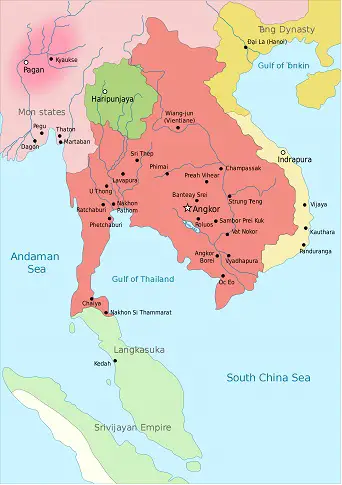 The Khmer culture reached its peak in the 12th century, having established a sophisticated feudal culture responsible for building one of the great architectural monuments, the temple complex at Angkor Wat. Based on Hinduism, the Khmer culture generated its own artistic and craft traditions, exhibiting a particular mastery of hydrology.
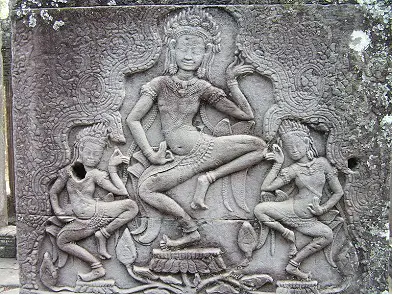 The Khmer kingdom was eventually overthrown by the rival Ayutthaya. This lead to a period of instability and decline. The region had long been part of the SE Asia trade complex, with the Khmer trading with Hindus and Chinese, followed by Arabs and finally Europeans. As a result of the Siamese-Vietnamese War of 1841-45, the Cambodians sought the protection of the French. One beneficiary of French protection was Pol Pot. In 1949 he was part of a group of 21 who had received scholarships to further their education in France. It was during his time in Paris that he encountered the writings of Marx and helped form a Marxist 'circle' of fellow Indochinese students. He joined the French Communist Party in 1952.
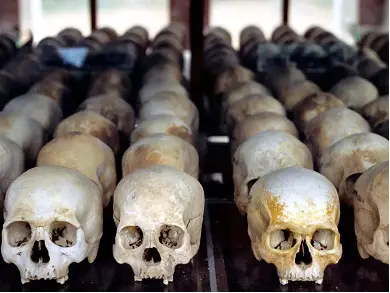 Inspired by the success of Mao in China he returned to Cambodia (Kampuchea) and with support of the Chinese communists eventually organised the overthrow of the government. In 1975 the Khmer Rouge instituted a policy of forced collectivisation. Part of this policy involved the elimination of perceived enemies of the state, with a particular focus on the educated elites. During this period it is estimated that close to 2 million died, with roughly half executed. The Khmer Rouge closed all schools and when they turned 8, children were sent to rural labor camps. Whilst a few escaped, most teachers and university professors were eliminated. Fortunately the Khmer Rouge reign of terror only lasted a few years, but it had a devastating impact on the level of education in Cambodia. This is a particularly cruel example of an ideologically based attack on human potential. The Khmer Rouge under Pol Pot had attempted to eliminate all difference to create a uniform, classless agrarian state. A clear violation of the DI.
Arabia.Before there was European colonisation there was Arab colonisation. In 632 an Arab army under the command of Abdul Rahman Al Ghafiqi attempted to take the town of Tours in central France. Had he succeeded the Arabs might have colonised France just as they had colonised Spain. In 1492 Columbus set out on his first journey to try and reach the Indies. 40 years earlier in 1453, the Ottoman caliphate conquered Constantinople, the centre of Christianity. In 1460 they colonised the heart of Western civilisation, Greece. Knowledge from the east and west flowed in and through the Islamic empire. Centres of learning were established and the arts flourished. Muslim scholars made important discoveries in a number of fields. And then it stopped and Islam turned in on itself. The primary cause was the influence of Salafism (5), a theological school that explicitly rejected innovation from the outside. The heartland of the Islamic empire is the Arabian peninsula, now fabulously wealthy due to oil; witness the glittering modern cities of Abu Dhabi, Doha and Dubai.
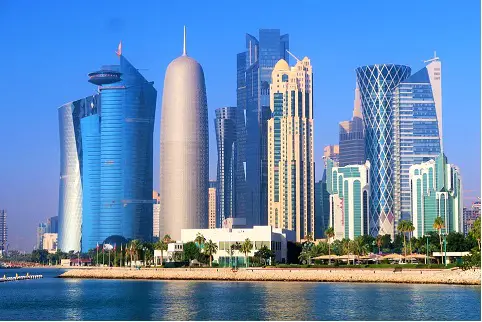 The glossy exterior hides a society based on vast inequality and overt discrimination. Throughout the Muslim world women are denied key rights and homosexuals are persecuted. In Afghanistan, ruled by the Salafist Taliban, girls are simply denied an education altogether, and whilst Saudi Arabia has not gone that far, it still places many restrictions on women. It is also worth noting that many Arab states were reluctant to end slavery, with Saudia Arabia only outlawing the practice in 1962, although some have argued that the treatment of migrant workers imported from Asia to build and service the glossy cities is a form of modern slavery.
Nigeria and West AfricaThe first recognised early state in Western Africa was the Nok civilisation (1,500 BCE - 200 ACE). The following centuries saw the rise and fall of several kingdoms. As with all other feudal level societies, there were no fixed or agreed borders. Kingdoms expanded and contracted. And like every other feudal system, slavery was a central institution. The larger kingdoms preyed on the smaller tribes. Jumping ahead to the 10th - 16th century we see the rise of the Songhai Empire (out of the Benin Empire), one of the largest African civilisations and the first to convert to Islam. It extended its trade in goods and slaves to the Arabic world through the Saharan trade routes.
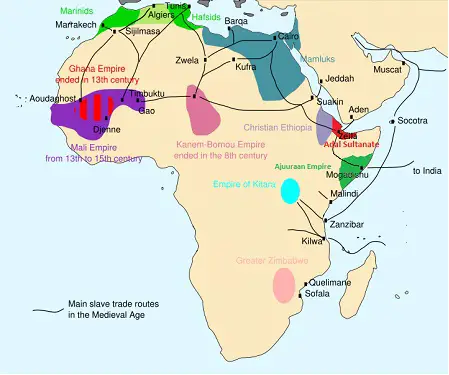
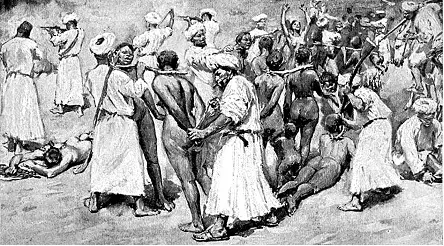 The African-Arab slave trade was well established by the time the Portuguese arrived in 1445. The Atlantic slave trade could only begin with the discovery and conquest of the Americas. Demand increased dramatically and the slaver kingdoms expanded their slave capture programs, reaching a peak in the 17th century. Whilst this trade was devastating for some tribes, it benefited the major slave trading kingdoms, especially the Ashanti, Dahomey, Igbo and Yoruba. When the British ended the slave trade a number of these kingdoms resisted. In 1851 the British navy bombarded Lagos to force the Yoruba king Kosoko to abolish slavery. British colonial rule ended in 1960, but the legacy of all previous conflicts between rival tribes and kingdoms created long lasting tensions. In 1967 the Igbo region of Biafra declared independence, leading to a devastating war and famine. Tensions between the Islamic north and Christian/Animist south date to 1914 with the defeat of the Hausa-Fulani Sokoto Caliphate. The history of Nigeria since independence has been one of political instability with a series of failed constitutions, contested elections and military coups (1966, 1983, 1993). As a result of this instability Nigeria is listed as a highly corrupt country. This extends from the wealthy clique at the top to the street level, with daily trade governed by 'area boys', gangs running protection rackets. Oil was discovered in 1903. Today Nigeria is part of OPEC and is the eighth largest oil and gas exporter. It also has substantial mineral deposits. Despite this, this wealth is not reaching the general population in the form of social services and infrastructure. According to a UNESCO report Nigeria has the highest number of children of primary school age not receiving an education, with vast disparities between the north and south. Nigeria is an example of political instability and endemic corruption preventing a significant proportion of the population from achieving its full potential.
China and the Chinese DiasporaChina has a deep historical connection to education. The first schools were established during the Shang dynasty (1800-1050 BCE). It is known that the Zhou kings organised formal education for the children of the aristocratic elite. In 605 ACE this was formalised into the imperial examination system. This system gradually shifted from educating the aristocracy to admitting students based on merit, with some poorer students given stipends. And whilst it can border on being a stereotype, it can be said that as a result the Chinese place considerable emphasis on a good education and identifying and rewarding children with exceptional talent. As a result Chinese culture made important innovations in philosophy, the sciences, technology and the arts.
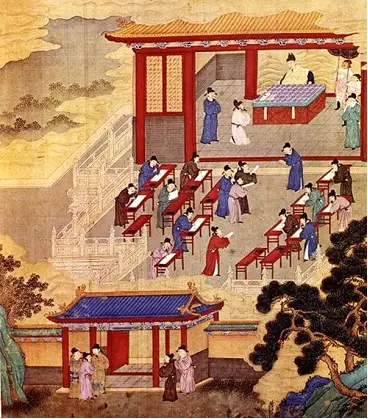 There is however, a caveat. The adoption of Confucianism as state ideology placed importance on conformity, most especially in terms of cultural criticism. There was still room for individualism, especially in the Taoist and Buddhist (the development of Chan - Zen) traditions. The process of opening up to the West created enormous conflict, not only in terms of wars to repel colonial expansion and exploitation (the Boxer rebellion, the Sino-Soviet war), but in terms of the introduction of radical new ideas. The Chinese intelligentsia began to engage with Western philosophy and art. The most transformative foreign influence was a German philosophy - Marxism. The communist revolution was a dramatic break with the supposed conservatism of the Confucian tradition. Under Mao, the communist vowed to overthrow the four olds: old idea, old culture, old customs and old habits. The Cultural Revolution intensified this upheaval. After the death of Mao, the communist party modified its views and embraced some aspects of capitalism under a one-party state. It is important at this point to remember that the Chinese had established communities around the world. They had migrated to America and Australia in the search for gold and Chinese traders had established communities throughout SE Asia, especially Malaysia and Indonesia. The diaspora communities often faced local discrimination (such as the 1998 riots in Indonesia and anti-Chinese laws in America and Australia), but they persisted and prospered. The rise of communism on the mainland caused a split with the diaspora, with the Chinese in Singapore, Taiwan and Hong Kong (and elsewhere) embracing capitalism and Western individualism. There has always been an active program by the Chinese communist party to infiltrate the diaspora to negate criticism. Chinese students in Western universities complain of spying and harassment and secret police stations have been exposed in several foreign countries. Chinese artists and intellectuals are under particular threat. Recently, PRC officials attempted to shut down an exhibition in Poland by Chinese-Australian artist Badiucao (so much for not interfering in the internal affairs of other countries). The communist party in China (and elsewhere) has always exercised tight control over artistic and political expression, with Russia and China imposing a style known as socialist realism. What better example than revolutionary opera.
Here we see artistic expression manipulated to serve the propaganda needs of ideology. Freedom of research and artistic and political expression is restricted - witness the chilling effect on Hong Kong under mainland control. This has lead to a situation where, despite its vast human resources, communist China does poorly in terms of innovation and creativity, relying instead on industrial espionage and intellectual property theft. At the same time, members of the diaspora are better able to reach their full potential across multiple fields, especially, but not exclusively, in Western Classical music. Born in Beijing, piano prodigy Yuja Wang had to leave China to pursue her prodigious talent.
The United States of America.Or should that read, the Disunited States? For many the United States has been the exemplar of freedom and democracy. At least, that's what Americans have been lead to believe. It has certainly succeeded in terms of industrial and economic development. With Britain it shares the world's top universities: Oxford, Harvard, Cambridge, Stanford, MIT… It has put a man on the moon and boasts the world's largest military. It is the home of billionaire entrepreneurs and innovators: Musk, Bezos, Jobs, Gates… And yet it is rated number 26 on the global democracy index. The US media is full of stories of a divided country, with some even speaking darkly of a potential second civil war. Others complain of collapsing infrastructure and increasing social inequality. It is the only member of the OECD not to have a universal healthcare system. People can be bankrupted meeting emergency health needs, essential medicines are priced exorbitantly. There is an extraordinary high rate of gun deaths (second only to Brazil), school shootings are a regular occurrence and racial tensions boil over into violent street riots. The reasons are complex but I am going to dare to suggest that the US has always been divided between four broad ideological factions.
1. Conservative Christian.Many of the first immigrants were religious refugees from Europe. The US was fertile ground for obscure sects and new denominations, from the Amish to the Mormons, from Shakers to the Branch Davidian. In recent decades the more fundamentalist denominations have become increasingly political and have coalesced around the theocratic ideology of Christian Nationalism.
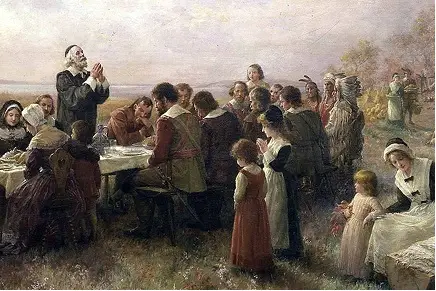
2. The Pioneers.Other immigrants were simply interested in land. They pushed west and in the process violently dispossessed the Native Americans, and fought wars against the French, Spanish and Mexicans. The archetype of the rugged individual (the cowboy), the entrepreneur building railroads, drilling for oil and struggling to tame the land (a theme most recently explored in the popular TV series Yellowstone and the prequels 1923 and 1883). This developed into the ideology of Libertarianism. It seeks to minimise the role of government, limit tax and oppose any legislation restricting a free market.
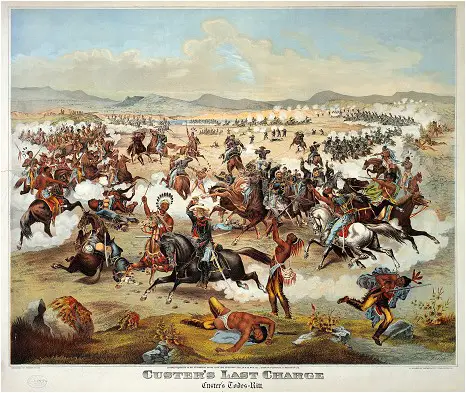
3. The Founding Fathers (Founders).The American War of Independence was a conflict to establish liberal democracy. The founding fathers were inspired by the French Enlightenment and the British Liberal movement. They believed in democracy and a constitutional republic governed by the separation of powers. They also believed in building institutions to support civil society. Federalism vs States rights. The New Deal.
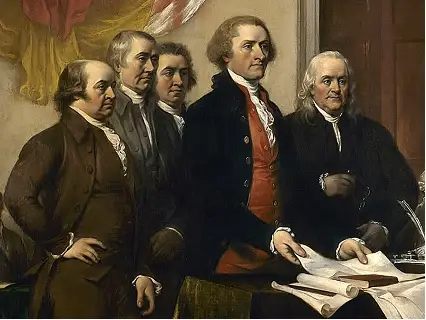
4. The Civil Rights movement.Democracy was initially confined to male landholders. Slaves, women and workers were denied civil rights. The US was late to abolish slavery and late to extend suffrage to women. It violently resisted attempts to establish unions. In recent years the push to extend rights has expanded to include sexual and gender nonconformists. These various groups have formed a loose and shifting alliance recently labelled 'woke'. It has created an incoherent ideology that combines elements of socialism, the counter-racism of the Black Panthers, radical feminism and LGBTQI rights.
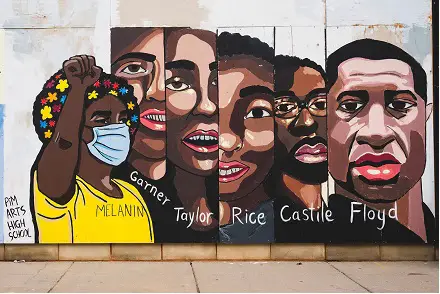 The ongoing conflict between these four groups has been called the 'culture wars', although the conflict is as old as the 'imperfect union' itself. The culture wars are having an increasing impact on the the US educational system. On the one hand Christian Nationalists are determined to rid the educational system of the 'woke' and return it to traditional values. Alarmingly there is an increase in book bans in US schools. Conversely those seeking to expand civil rights (the woke) are resorting to the traditional tactic of the political purge, now called deplatforming and cancel culture. Conservative Christians have formed an alliance with Libertarians to push out the remaining Founders in the Republican Party. Founders and civil rights activists represent the centre and left of the Democratic Party. History tells us that extremism of the left generates extremism of the right, and vice-versa. History also tells us that both extremes engage in censorship in order to protect their ideological prejudices. This extremism has lead to US politics becoming sharply polarised. I am well aware of the irony that the US has been a leader in developmental psychology and integral theory. There can be no doubt that a certain section of the population has been able to reach their highest potential. But it is also clear that other sections of the population are being denied a similar opportunity. The More Successful Cultures.No culture is perfect, but some have done better than others at meeting the full spectrum needs of its citizens. Maybe it's the result of exposure to the northern lights or the communal sauna culture, but by most measures the countries that best support the full hierarchy of needs, from basic survival to self-realisation, are the social democracies, particularly the Nordic countries. Yes, they still have serious social problems, but who does it better? Who can they learn from?

According to the World Population Review (6),
The History of Human Rights and Cultural Relativism.Aristophanes's play Lysistrata tells the story of women protesting the tyranny of war. In 73 BCE, the gladiator Spartacus lead a slave rebellion that threatened to overthrow Rome. In 184 ACE, the Yellow Scarves Rebellion saw a peasant army rise up against the Han dynasty (Chinese history is full of such rebellions). In India various political and religious movements opposed the oppressive caste system. Throughout history and across cultures, people have rebelled against oppression.
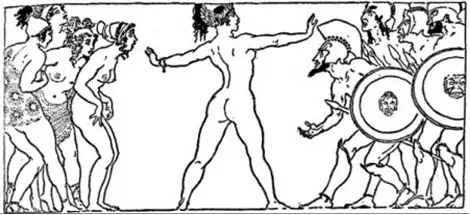 The drive for liberation and personal expression is universal. Some of the world's religions were founded as acts of rebellion against the existing order. The modern concept of human rights crystallised after the Enlightenment, first as a working class rebellion against the feudal elites. It then expanded to the freeing of slaves and then to rights for women. Religious and cultural traditionalists have long resisted the human rights agenda, twisting the argument to one of cultural or traditional rights. In many cases human rights are considered a 'Western' imposition on traditional societies. A deeper examination reveals that these traditional societies have had their own histories of resistance and rebellion. And in many cases the call for rights comes from within those societies as a response to oppression in the name of a particular ruling order or set of beliefs. It ought to be obvious that the drive for human rights is an expression of the developmental imperative. Despite this, many well meaning people decide to support oppressive cultural systems in the mistaken belief they are supporting cultural or religious rights. We hear the absurd argument that the 'West' is imposing its values on other cultures - it's 'their culture', we mustn't interfere. In too many cases this turns out to be an excuse to tolerate policies of oppression, most notably against women, (even when, as is the case with Iran, women ask for support from Western feminists). The DI demands that individuals be given the freedom to choose. If they choose to adhere to traditional values that is their right. Equally it should be their right to reject traditional values. NOTES
Comment Form is loading comments...
|